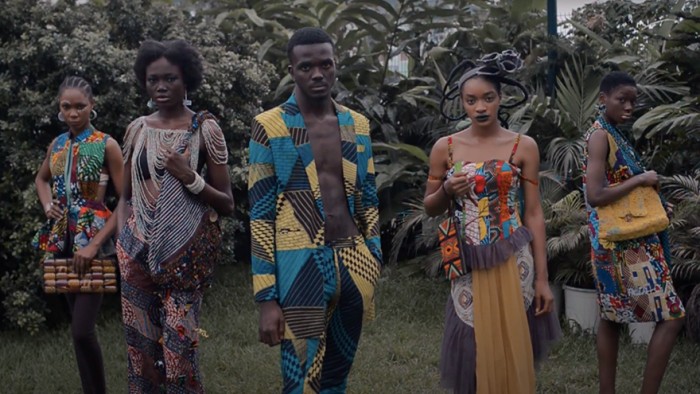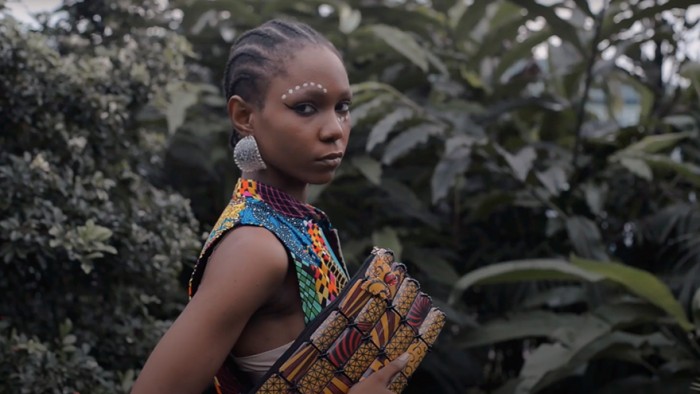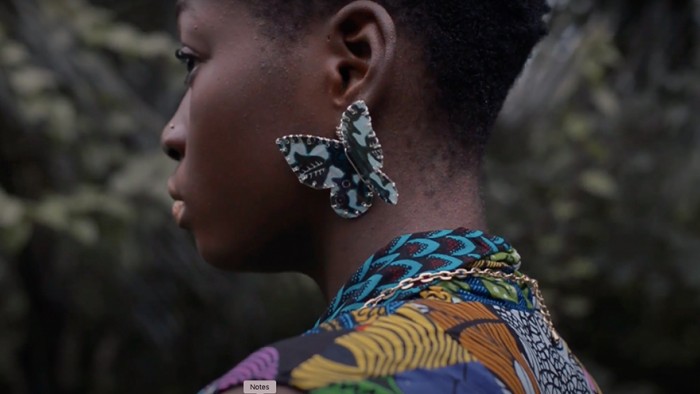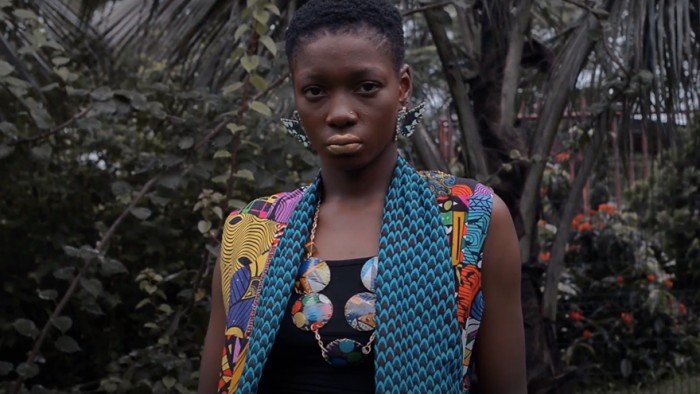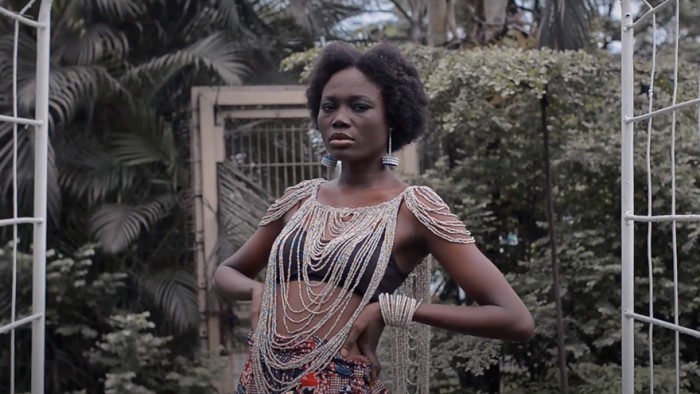Re-roll Station is a six-week, intensive digital programme to help African fashionistas launch their brands into the global market. The aim is to provide creative entrepreneurs with actionable steps to grow brands that are environmentally friendly, socially inclusive, and profitable.
Re-roll is the brainchild of Cher Potter and Kesiena Harry. Harry is the Programs Manager at the Annaire Art and Fashion Academy in Port Harcourt, Nigeria. He is also a member of the WEF global shaper community that targets fashion entrepreneurs who want to collectively and positively contribute to climate action.
Potter is a South African design curator, educator and founder of AfriDesignX, a pioneering sustainable design research hub. This will soon be relaunched as Design X Foundation.
Harry worked alongside Potter to pilot the 5-module Re-roll course taking place over 2 phases. The course was developed with the generous input of Annaire’s Director Ireoluwa Soetan and with financial support from the British Council Multiplier Labs programme.
What inspired the creation of the Re-roll Station and its focus on the African continent?
More than 15 million tons of used textile waste is generated each year in Africa. The amount has doubled over the last 20 years, especially with the rise of fast fashion and the importation of second-hand clothing during this period.
Africa is fondly referred to as the ‘Republic of Fashion Waste’ mainly because from Asia to America and Europe, the continent serves as the dumping ground for
second-hand clothing. This is done primarily to reduce textile waste in more advanced countries and to give clothes a second life.
However, while this supports second-hand clothing markets, it also generates unimaginable volumes of waste ending up as landfill within African capitals. In Accra, the Kpone landfill receives up to 700 tons of fashion waste daily (Borgen Project).
Our Earth is simply not capable of absorbing the huge amount of clothing waste produced each year. While Re-roll does not support this importation of excess and used garments, it realises that there is an amassed volume of raw material able to respun, rewoven and redesigned into beautiful and original wearable items.
Design centres across the African continent boast centuries of knowledge about weaving, beading, hand dyeing and embroidery – skills which can advance this transformation. Reusing these resources will not only save the planet, but has the potential of generating huge revenue – especially as the global industry looks for new ways to reinvent itself in the 21st century.
How long does the course take to complete? Are there any specific modules on upcycling and sustainability?
It is a six-week course, designed to work around a professional schedule. It is divided into two phases – the first focuses on design and the second, on leadership.
In the first phase, there are four modules. These cover: An Introduction to Sustainability in Fashion, Ethical Methods of Design and Development, Ethical Methods of Production and Manufacturing, and Communicating and Marketing as a Sustainable Brand. These modules try to answer some of the most pressing questions for fashion designers across the continent, “How do I start producing ethically?”, “How do I sell across or beyond Africa?”, “How can I connect with the right influencers and collaborators in the global market?”.
Phase Two focuses on leadership and best business practices. It includes the modules Defining your Sustainable Leadership Model, Organisational Culture and Business Structuring, and Intellectual Property. These modules answer questions like “How can I motivate my team around a sustainable recycling agenda, even though this is not yet valued within our society?”, “How can I protect the innovative methods that we have worked so hard to develop?” and “Can a woman creative be a leader?”.
Each of the modules consist of workshops and lectures. These are delivered by some of the world’s leading experts in the field of sustainable fashion. Professor José Teunissen is Dean of the School of Design and Technology at London College of Fashion; Nkwo Onwuka is a pioneering designer at the forefront of the sustainable fashion movement in Nigeria; Professor Rebecca Earley is Co-founder of the Centre for Circular Design at Chelsea College of Arts and TED Ten; Samson Soboye is Founder and Creative Director of SOBOYE, a London sustainable fashion & lifestyle brand; and many more as seen on reroll.aafacademy.com
We are driven to support designers not only to better understand sustainable fashion methods, but to build sustainable businesses able to sustain themselves, their families and a growing number of employees.
In 2022, as we move into the second year of delivery, Phase One will expand to include a major joint design project across Re-roll and UK arts and design universities. Phase Two of the programme will expand to include modules on financial accounting, intellectual property rights in-depth, and government regulation RE sustainable practice. We will also launch an online community forum for all past, current and future participants to help generate and track the sustainable transformation of fashion on the continent.
Are there any specific online networking tools available for the course?
We state at the beginning of the course that to join, you must have a dedicated interest in supporting your fellow participants and helping them to solve the problems that they face within their own companies. We are absolutely clear that developing a sustainable fashion agenda on the continent is group work and requires collaboration.
In 2021, our cohort included professionals from across Nigeria, Kenya, Botswana, Mauritius, Ghana, Zambia, Egypt and South Africa. We were thrilled that two of our participants started a joint-venture together after completing the course – and we will do all we can to support them with this.
Furthermore, all lecturers and workshop facilitators remain an active part of the Re-roll network and on-hand to answer any questions that professionals may have going forward. Re-roll is so much more than a course. It is fundamentally a supportive and activated network with an ambition to transform fashion practice across Africa, promoting climate-positive design action!
Who is the ideal candidate for this course?
The course is designed for fashion entrepreneurs that have been in business operations for not less than 12 months. It is geared towards those who are currently using ethical models of production, but also to those who aim to introduce and implement more ethical models into their existing businesses.
What do you hope designers will gain from this course?
Designers will gain access to world-leading mentors, leaders in the field of sustainable fashion. They will learn and share experiences on how to manage people in a sustainable way. They will learn more ethical ways to design and manufacture their products, how to communicate the narrative of their brand, how to protect their creativity, and how to access new audiences and platforms. Ultimately, participants will leave with a renewed mindset about fast fashion’s effect on the planet and their pivotal role as designers and agents of change to revolutionise the fashion system.
Credits: Cher Potter and Kesiena Harry
Read more:
Nine climate-conscious fashion designers showcase at COP26.
No Waste Challenge winner, Clothing Loop swaps Fast Fashion for sustainability.

